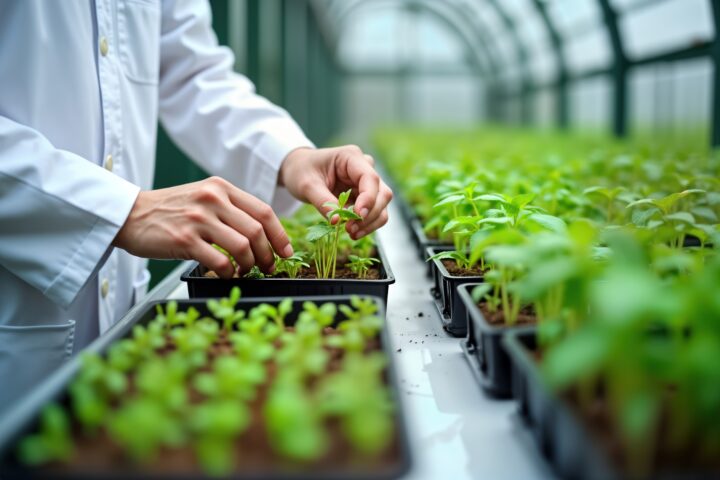We are bringing up the rear in Europe when it comes to plant protection
Plant protection products that have been approved in the EU should also be authorised in Switzerland as quickly as possible, writes guest author David Brugger from the Swiss Farmers' Union.
Thursday, January 23, 2025
They should be glowing yellow now – the rape fields. But instead of a rich yellow, there is a lot of green to be seen. The reason for this is the enormous infestation of the rape beetle. Despite two to three treatments with an insecticide, it can no longer be adequately controlled. To a large extent, the problem is homemade. In recent years, we in Switzerland have lost around a third of all active ingredients in plant protection products. Two-thirds of the insecticides used to control pests in oilseed rape have now been banned, without the authorities providing any effective alternatives. Seed dressing products have also been phased out.
The federal government realises that things can't go on like this.
One of the reasons for this is our completely gridlocked approval system for plant protection products. There are 770 products currently in the approval process, and the waiting time is also record-breaking. In some cases, it has been eight years already. After massive pressure, environmental organisations were granted a comprehensive right to a say in the matter a few years ago, the likes of which is not seen anywhere else in Europe. The consequences of this drastic remedy are now visible everywhere in the fields. There is a lack of solutions for combating wireworms, spotted wing drosophila and the cotton bollworm, which are destroying the harvests of entire cherry, bean and sweetcorn fields. But gaps in the use of herbicides are also causing problems. Problem grasses and weeds are continuing to spread. The federal government now realises that things cannot go on like this.
In an interim report on the implementation of the National Action Plan for Plant Protection, the Federal Office for Agriculture found that only two of the three main objectives were being achieved: protection of the environment and of humans. For the third objective, protection of crops, there was deterioration instead of improvement. The federal government is therefore proposing a revision of the Plant Protection Products Ordinance. However, the proposal does not in any way solve the urgent problems in practice. In principle, it only provides for an increase in the number of staff by 6 to 52 (!) full-time positions. The basic problem – the completely blocked and inefficient authorisation process – remains unsolved.
Damage to plant production in Switzerland
That is why we propose introducing the same procedure for plant protection as has been successfully practised for biocides for many years. In this area, Switzerland has always adopted the EU authorisation decisions – without anyone ever being upset about it or making unacceptable concessions to the environment. One third of all plant protection products are also authorised as biocides. If they are used as plant protection products, they are disadvantaged.
Until a few years ago, environmental organisations were full of praise for the EU authorisation process. Today, they want nothing more to do with it. Switzerland should ban everything immediately and without its own review if the EU does so. However, when new products come onto the market, they should continue to have to wait years for their authorisation in Switzerland. In the end, plant production in Switzerland will lose out – precisely the area that the authorities, parliament and environmental organisations would like to see promoted urgently.
David Brugger is head of plant production at the Swiss Farmers' Union. This article was first published in the «BauernZeitung» on 15 April 2024.
Kindly note:
We, a non-native editorial team value clear and faultless communication. At times we have to prioritize speed over perfection, utilizing tools, that are still learning.
We are deepL sorry for any observed stylistic or spelling errors.
Related articles

Biotechnology has only just begun
When Frank Schirrmacher cleared the pages of the Frankfurter Allgemeine Zeitung's arts section on 27 June 2000 to publish the human genome, which had just been deciphered for the first time, letter by letter over six pages, biotechnology came to the attention of the general public for the first time.

Faster Approval of Crop Protection Products Long Overdue
Switzerland is busy banning active substances that have also been withdrawn from the EU market. But in the other direction, it is dragging its feet: modern products that are already approved in neighboring countries remain blocked here. That could finally change now. The Economic Affairs and Taxation Committee of the National Council has adopted a corresponding proposal.

Genetic scissors for the future – soon in Switzerland too?
Genome editing is seen as a promising way to make agriculture more sustainable and climate-resilient. But Switzerland is hesitant to approve it. A popular initiative even wants to ban it. But what can CRISPR really do?

Genetic engineering? Yes, of course.
As a consumer, you often don't know: products advertised as GMO-free have long contained genetic engineering. This is a thorn in the side of opponents of genetic engineering. But it is easier to keep quiet about the ‘scandal’ – because something we have been eating for a long time no longer scares us.

